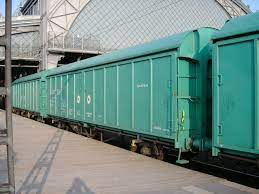ü
Definition: The interval of
time between two successive loadings of a wagon is called Wagon Turn Round.
ü
Wagon
Turn Round performance is denoted in terms of "Days".
ü
If
the No. of Wagon Turn Round days is reduced, the performance considered to be
more or vice versa.
ü
In simple terms, "calculated from the time a wagon is
placed for loading till the time it again becomes available for reloading",
is the actual wagon turn-round.
ü
Thus, all detentions to a wagon, from the time it is placed for
loading till it is again placed for reloading after passing through the cycle
of loading, dispatch, transit, unloading and again made available for
reloading, enter into the calculation of turn-round.
ü
Means
wagon turn round is 11 days means, the wagon could be loaded around 32 times a
year. (360 days/11 days).
ü
If
wagon turn round is reduced from 6 days to 5 days, the same wagon could be
loaded around 72 times a year. (360 days/5days).
Year
|
1950-51
|
2013-14
|
Wagon Turn Round
|
11 days
|
5.13 days
|
ü
This
(Reduction of Wagon Turn Round days) has been achieved as a result of
a)
improved
mobility of wagons.
b)
quick
loading & unloading of wagons.
c)
reduction
in detentions.
d)
and
improvement in speed of goods trains.
ü
Formulae
for WTR - Wagon Turn Round =
WB/(L+R)
ü
WB is Wagon Balance (effective average), L is Daily
average number of wagons Loaded, R is Daily average number of wagons Received.
Practical example of WTR:
Calculate
Wagon Turn Round from the following data:
1.
Daily
Average Wagon balance: 15500
2.
Average
daily non effective wagons A) Sick - 200
B) Departmental -300
3.
Average
daily loading - 800
4.
Average
daily received - 700
Answer:
1.
Effective
average wagon balance daily = Wagon balance minus Sick & Dept
= 15500 - (200+300)
= 15000
2.
WTR
= WB/(L+R)
WTR= 15000/(800+700)
WTR= 10
ü
Wagon
is the bread earning horse of the Railways, load it adequately. Make it run and
don’t stable it.
******

No comments:
Post a Comment
Note: Only a member of this blog may post a comment.